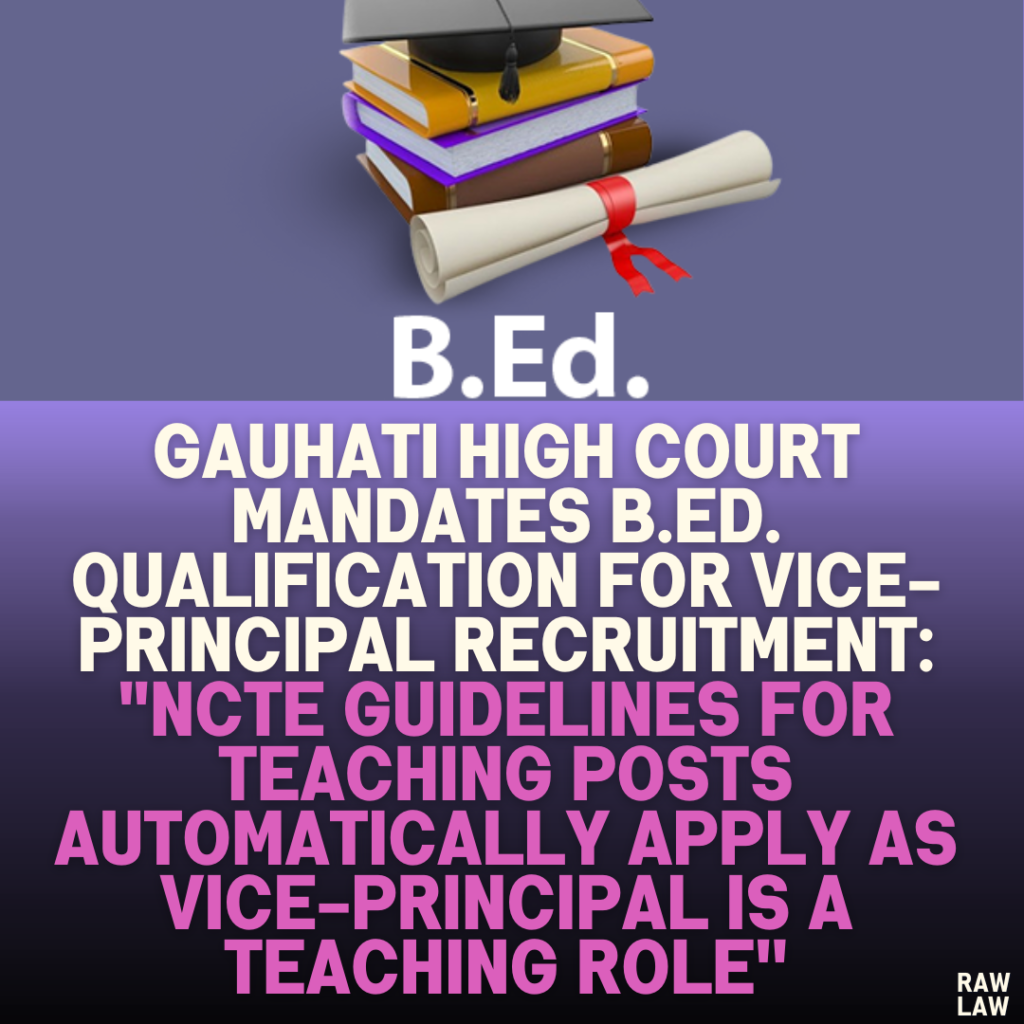Court’s Decision:
The Gauhati High Court held that the omission of the B.Ed./B.T. qualification for recruitment to the post of Vice-Principal under Rule 13 of the Assam Secondary Education (Provincialized Schools) Service Rules, 2018, violates the mandatory qualifications prescribed by the National Council for Teacher Education (NCTE). The court emphasized that the Vice-Principal is a teaching post, and NCTE guidelines must be strictly adhered to for both teaching and promotional positions.
Facts:
- The Assam Secondary Education (Provincialized) Service Rules, 2003, initially regulated recruitment qualifications for teaching positions, including the Vice-Principal, but did not mandate a B.Ed./B.T. qualification for the post of Vice-Principal.
- In 2012, amendments to the 2003 Rules mandated B.Ed./B.T. qualifications for Graduate and Post-Graduate Teachers but not for Vice-Principals.
- The Assam Secondary Education (Provincialized Schools) Service Rules, 2018, repealed the 2003 Rules and retained the omission of the B.Ed. qualification for Vice-Principals. The petitioners challenged this omission, arguing that it contravened NCTE guidelines.
- The State justified the omission as necessary to allow promotion of teachers recruited prior to 2012, who did not possess B.Ed. qualifications.
Issues:
- Whether the omission of the B.Ed. qualification for Vice-Principal recruitment under the 2018 Rules contravenes the mandatory requirements prescribed by the NCTE.
- Whether the State’s justification for the omission—to promote teachers recruited before 2012—holds merit in light of the NCTE’s mandatory standards.
Petitioners’ Arguments:
- The petitioners contended that the omission of the B.Ed. qualification for Vice-Principal recruitment violated NCTE guidelines, which mandate a B.Ed./B.T. degree for all teaching positions, including promotions.
- They argued that the Vice-Principal is a teaching post under Rule 2(z) of the 2018 Rules, and the omission of the B.Ed. requirement undermines teaching standards.
- The petitioners relied on precedents emphasizing the supremacy of NCTE regulations in determining qualifications for teaching posts.
Respondents’ Arguments:
- The State argued that the omission was deliberate to provide promotion opportunities to Graduate and Post-Graduate Teachers recruited before 2012 who did not possess B.Ed. qualifications.
- It submitted that including the B.Ed. requirement would disqualify these teachers, denying them career advancement.
- The State maintained that the omission was necessary to balance administrative and equity considerations.
Analysis of the Law:
- Role of NCTE: The National Council for Teacher Education Act, 1993, empowers the NCTE to prescribe minimum qualifications for teachers to maintain uniform teaching standards. This includes both initial appointments and promotions.
- NCTE Guidelines:
- The 2001 NCTE Regulations mandated a B.Ed./B.T. qualification for teaching positions at the Secondary and Senior Secondary levels.
- The 2014 NCTE Regulations reiterated that the B.Ed./B.T. qualification is mandatory for both teaching positions and promotions to higher teaching posts.
- Assam Rules: The 2018 Rules omitted the B.Ed./B.T. requirement for Vice-Principals while mandating it for Graduate and Post-Graduate Teachers and Principals. This omission created a contradiction with NCTE guidelines and undermined teaching standards.
Precedent Analysis:
- Raju Chakraborty v. State of Assam (2020): The court held that NCTE guidelines prescribing qualifications for teachers are binding and must be followed uniformly.
- All Assam Higher Secondary Teachers & Employees Association v. State of Assam (2014): The court directed the State to reconsider the imposition of qualifications that unfairly excluded certain teachers, highlighting the need for equitable and uniform qualification standards.
Court’s Reasoning:
- The court emphasized that the Vice-Principal is a teaching post under Rule 2(z) and Rule 3 of the 2018 Rules. As a result, NCTE guidelines mandating the B.Ed./B.T. qualification for teaching roles automatically apply to the post.
- The omission of the B.Ed. requirement was deemed arbitrary and violative of the NCTE’s statutory prescriptions.
- The court noted that while administrative considerations, such as accommodating pre-2012 teachers, may justify transitional measures, they cannot override mandatory statutory requirements.
- The State failed to establish any classification or distinction that could justify exempting pre-2012 teachers from the B.Ed. requirement for Vice-Principals.
Conclusion:
The court struck down the omission of the B.Ed./B.T. qualification for Vice-Principal recruitment under Rule 13 of the 2018 Rules. It directed the State to amend the rules to include the B.Ed. requirement, ensuring compliance with NCTE guidelines.
Implications:
- Standardization of Qualifications: The judgment reinforces the mandatory nature of NCTE-prescribed qualifications for all teaching posts, including promotional roles.
- Administrative Reforms: The State will need to amend its rules to align with the NCTE guidelines, ensuring uniformity across teaching hierarchies.
- Future Promotions: Teachers aspiring to the Vice-Principal position will now need to possess B.Ed. qualifications, raising the overall standard of teaching and administration in schools.
